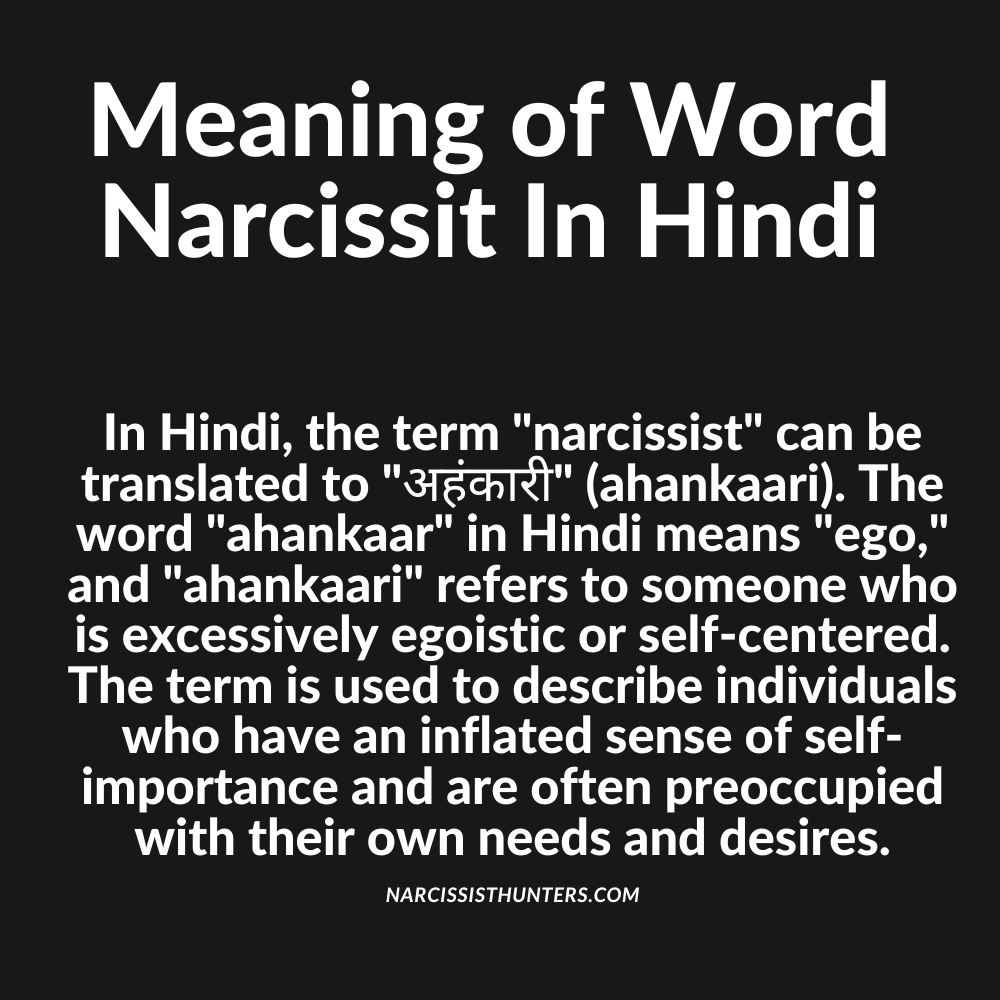The term “narcissist” has become increasingly popular in recent years, particularly in the field of psychology. However, the concept of narcissism is not new and can be traced back to ancient Greek mythology. In today’s society, narcissism is often used to describe individuals who are overly self-involved and lack empathy towards others. Many people want to know what is the meaning of narcissist in Hindi language?
The purpose of this blog post is to explore the meaning of narcissist in Hindi and how it is viewed in Hindi culture. Additionally, we will discuss the common characteristics of a narcissist, the impact of their behavior on relationships and mental health, and strategies for coping with a narcissistic person.
Meaning of Narcissist in Hindi

In Hindi, the term “narcissist” can be translated to “अहंकारी” (ahankaari). The word “ahankaar” in Hindi means “ego,” and “ahankaari” refers to someone who is excessively egoistic or self-centered. The term is used to describe individuals who have an inflated sense of self-importance and are often preoccupied with their own needs and desires.
The etymology of the word “narcissist” comes from Greek mythology. According to legend, Narcissus was a handsome young man who fell in love with his own reflection in a pool of water.
He became so infatuated with his image that he could not bear to leave it, and eventually, he died staring at his reflection. The term “narcissism” was coined to describe individuals who are similarly preoccupied with their own image and self-importance.
Examples of word Narcissist From Bhagavad Gita
The term “ahankaar” is referenced in several passages of Bhagavad Gita, important ancient Indian text that explore Hindu philosophy and spirituality. Here are a few examples:
- “The one who is free from the ‘ahankaar’ (pride) and who has conquered the senses, who has realized the supreme truth, and who is always absorbed in the welfare of all living beings, attains the supreme goal.” – Bhagavad Gita 18.55
In this passage, the term “ahankaar” is used to describe the negative quality of pride, which is seen as a barrier to spiritual growth and enlightenment.
- “One should remain steadfast in yoga, O Arjuna. Yoga is skill in action. The one who is ‘ahankaar’-less, whose mind is fixed in knowledge, who does his duty without attachment, and who is not affected by success or failure is said to be a sage.” – Bhagavad Gita 2.50
Examples of word Narcissist From Hindu Literature
The term “ahankaar” is used in literature to describe the concept of ego, self-importance, and pride. Here are a few examples:
- Ramayana: In the epic poem Ramayana, the character of Ravana, the demon king of Lanka, is portrayed as a symbol of arrogance and excessive pride. He is often described as having a strong “ahankaar” that ultimately leads to his downfall.
- Mahabharata: In the Mahabharata, the character of Duryodhana is depicted as someone with a strong sense of “ahankaar” and ego. His arrogance leads him to challenge the Pandavas and ultimately leads to the war of Kurukshetra.
- Upanishads: The Upanishads, a collection of Hindu texts, describe the self as being distinct from the body and the mind. The ego or “ahankaar” is seen as a barrier to realizing one’s true self and achieving enlightenment.
- Yoga Sutras of Patanjali: The Yoga Sutras of Patanjali, a foundational text on yoga philosophy, discuss the concept of “ahankaar” as one of the five kleshas or obstacles to spiritual growth. The sutras describe “ahankaar” as the identification of the self with the ego or the individual personality.
Overall, the concept of “ahankaar” is a recurring theme in Hindu literature and is often used to describe the negative effects of pride, arrogance, and ego. It emphasizes the importance of humility, self-awareness, and detachment as key virtues for spiritual growth and enlightenment.
Understanding Narcissism in Hindi Culture
In Hindi culture, narcissism is often viewed as a negative personality trait. It is not uncommon for individuals to be criticized for being overly self-involved or lacking empathy towards others.
However, the concept of narcissism is not as widely recognized in Hindi culture as it is in Western cultures. This may be due to the fact that Hindi culture places greater emphasis on collectivism and community values rather than individualism.
Despite these cultural differences, narcissism is still present in Hindi culture, and individuals who display narcissistic behavior are often viewed negatively.
It is important to note that not all individuals who display narcissistic behavior are necessarily narcissists, as there can be a wide range of reasons for such behavior.
Characteristics of a Narcissist
Narcissistic individuals often exhibit a wide range of common traits. These can include a grandiose sense of self-importance, a need for constant admiration and attention, a lack of empathy towards others, and a tendency to exploit or manipulate those around them.
Additionally, narcissists may exhibit a sense of entitlement, a tendency to be jealous of others, and a belief that they are superior to others.
While some of these traits may be present in most people to some degree, it is the combination and severity of these traits that distinguishes a true narcissist.
It is important to note that narcissism is not a diagnosable mental health condition but rather a personality trait that can be present in individuals with various mental health disorders.
Impact of Narcissistic Behavior
The impact of narcissistic behavior can be significant, both on the individual and those around them. Narcissistic behavior can negatively affect relationships, as narcissists often prioritize their own needs and desires over those of others. They may be prone to emotional manipulation or abuse, and may struggle to form genuine connections with others.
Additionally, the impact of narcissistic behavior on an individual’s mental health can be profound. Narcissists may struggle with feelings of emptiness or inadequacy, despite their outward confidence. They may also struggle with anxiety or depression, as well as other mental health disorders.
Last words
In conclusion, the concept of “ahankaar”(narcissism) plays a significant role in Hindu literature and philosophy. We discussed the meaning of narcissist in hindi in this post. It highlights the importance of recognizing the negative effects of ego, self-importance, and pride and emphasizes the virtues of humility, self-awareness, and detachment.
By understanding the meaning and significance of “ahankaar” in Hinduism, we can cultivate a deeper understanding of ourselves and the world around us, leading to greater spiritual growth and enlightenment.
As we continue on our journey of self-discovery and personal growth, let us strive to cultivate humility and self-awareness and overcome the barriers of “ahankaar” that prevent us from realizing our true potential.


